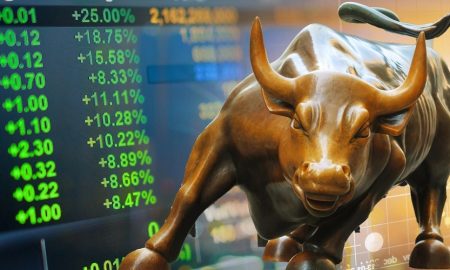
Investors Begin to Take Protective Measures Ahead of Impending Economic Recession

Causes of Increasing Anxiety
According to several news agencies, investors have become more anxious about the impending economic recession and their nervousness is further increased by the rising interest rates and the additional restrictions on credit availability.
While speaking to a media outlet sometime last week, Roelof Salomons, a chief strategist at Kempen Capital Management noted that it was a classic late-cycle story and confirmed that investors becoming more nervous about the whole situation. It was explained that a late cycle referred to an economy that has been experiencing growth but is also on the path to falling into a recession in the presence of a tighter monetary policy, a tighter credit availability and lower profit margins.
Salomons explained that all the signs pointing to a late cycle were in existence, including the flattening yield curve which predicted an upcoming recession, the widening credit spreads that suggested that investors were afraid to take risks and the outperformance of defensive stocks which were usually considered safer options to surviving changes in the economic cycle.

Salomons explained that all the signs pointing to a late cycle such as flattening of the yield curve, widening credit spreads and outperformance of defensive stocks, were already existing
He further stated that everyone was discussing the exact period when the cycle would roll over, and he opined that it would take place in late next year or the early months of 2020. Salomons added that it was too early for the economy to roll over, but the time was right for market rollover.
Salomons suggested that investors were taking lesser risks with U.S. stocks showing that emerging market equities and investment grade credits were no longer preferred.
Effect of Bull Market End
The senior equity analyst at Indosuez Wealth Management, Laurent Godin, aligned his thoughts with Salomon. He stated that the market concern bordered on the duration of the global economy expansion cycle and the bull market currently had a limited runway. He added that an end to the bull market would be suggestive of the fact that equities might fall in place leading to a boost in sales.

Laurent Godin stated that current market concerns were about the duration of the global economic expansion cycle
Godin noted that if such happened, the best sectors to hold would be financials, energy, and technology. Godin also stated that these three sectors would be the greatest beneficiaries for the most net analyst upgrades for the subsequent quarters. He, however, added that equity markets would experience more volatility in the following months as well as a limited upside.
Previous Recession Warnings
Media outlets reported sometime last month Wall Street strategists announced a looming economic meltdown, and that the probability of having an inverted yield curve also stood as a recession indicator for several investors.
Sometime last month, the senior US economist at Bank of America Merrill Lynch, Joseph Song, projected that the not-so-positive effect which the trade war would have on the US GDP. He stated that the yearly growth rate of the real gross domestic product would drop by 0.3 to 0.4 percentage points compared to the baseline in the first year and a subsequent 0.5 to 0.6 percent drop would occur in the second year. Song also projected that the adverse effect on GDP, in addition to a jolt in the high level of confidence could cause the economic meltdown.
James Barty, BAML head of global cross-asset and European equity strategist, also noted last month that although the tariffs which were imposed at the point had little effect, the higher tariffs proposed could decrease the global growth forecast. Referring to International Monetary Fund (IMF) data, Barty stated that if the US, Europe, and China raised their import prices by 10% each, then the GDP would decline by 2-3% in the three regions, and that was without putting into consideration other surface effects such as the disruption of supply chain. Sources claimed that investors worldwide had started reacting to the looming trade war by pulling out a massive amount from both emerging market and global equity fund
The different indicators such as the interest rate and tightening credit availability made Jim Paulsen, who the chief investment strategist at Leuthold Group, to state that he was observing the conditions which he believed would be the cause of economic recessions and his observations were not good. Paulsen, who also closely observed consumer confidence which he stated were capable of providing reasonable insights into when economic expansions were dull for rollover noted that a decline in the measure from peak levels was an indication that there were tough times ahead.
More in Business
-
`
Streaming Giant Netflix Faces Yet Another Challenge
In the ever-evolving landscape of streaming entertainment, Netflix, once the unchallenged king of digital content, now faces a complex puzzle beyond...
December 1, 2023 -
`
Signs You Should Quit Your Current Job & Move On
You Don’t Feel Comfortable at Work Imagine spending the majority of your waking hours in a place where you feel uneasy,...
November 20, 2023 -
`
How to Adjust and Renew Your Portfolio
Investing in the financial world is like navigating an ever-changing landscape—constantly evolving, always shifting. The key to staying on track? Regularly...
November 18, 2023 -
`
Dr. Dre’s Divorce With Nicole Young: A Closer Look
When the beats of old-school hip-hop start bumping, Dr. Dre’s name reverberates in fans’ minds worldwide. Born as Andre Young, this...
November 12, 2023 -
`
Why Branded Content Is the Best Way to Connect With Your Audience
Have you ever found yourself deep in a compelling article or engrossed in a video series, only to later discover that...
November 5, 2023 -
`
Why the Gender Pay Gap Could Be Getting Worse | New Research Findings
At a time when women are making significant strides in various professional arenas, a new report throws light on a trend...
October 28, 2023 -
`
What Is a Bull Market and How Can Investors Benefit From One?
In finance, the term “bull market” is frequently used to describe a period of optimism, rising asset prices, and investor confidence....
October 19, 2023 -
`
A-List Power Couples Where the Women Make More Money
In an era of shifting gender roles and evolving definitions of success, it’s increasingly common to find celebrity couples where the...
October 15, 2023 -
`
Massive Price Cuts: Tesla Only Witnesses ‘Modest’ Sales Gain in China
Cutting Down Prices, But Not Cutting the Mustard? Summer 2023 brought with it a promise of sunshine and relaxation. For Tesla...
October 8, 2023















You must be logged in to post a comment Login